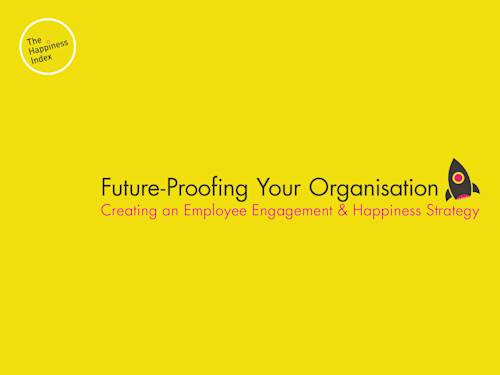
Creating an Employee Engagement AND Happiness Strategy
Love it or loathe it, the Football World Cup is taking over headlines and attention spans across the world. Many organisations have said they’re increasing flexibility so that people can catch matches during the work day. At The Happiness Index we love flexibility, but don’t forget, flexibility should be always and for everyone - not just the world cup!
The football world cup is one of the biggest events of the sporting calendar. Whether you love it or loathe it, there’s sure to be someone in your organisation who’s going to be invested in the games. For many organisations this can cause problems - if games are during work hours, which they often are, it can be very disruptive. Whether people are taking time off, are trying to multitask, or even taking a sneaky sick day, you might find that your team are less productive than normal.
Across the HR space we’re seeing people encourage organisations to allow their teams to work flexibly, so that they can make up the time they spend watching matches. For those who are able to spend some extra time at the end of the work day this can be an excellent solution. Even if it may not work for everyone.
Flexibility is great for your team because it places trust on your people to make up time at a time that works for them. This allows them the freedom to work when they’re going to be performing at their best.
Neuroscience actually shows us that humans are really bad at multitasking. Not only this, once distracted it can take as long as 15 minutes to get back onto task. Plus, those who are multitasking are more likely to make mistakes. In short, ideally you need your team to be able to give their full focus to their work. Ideally this means giving people the time to watch the football and then return to their work later.
Giving your people flexibility in circumstances like this can really support a happy workforce. This is because it supports 3 key neuroscience themes that feed into employee happiness. Let’s have a closer look at these themes.
When your team feels trusted to do their jobs in the best way and at the best teams, this really assists your people’s sense of safety. If they feel like their managers and senior leadership have trust in their ability to get their work done then this will give them the best opportunity to perform at their best.
We all know that work-life balance is particularly important for mental and physical health. However, being in control of this balance and being able to decide how best to achieve this again supports safety within your organisation.
We’re big fans of Freedom to be Human at The Happiness Index, in fact it’s our vision. A large part of this is autonomy. Giving people the freedom to complete their work in the ways that they find best and at the time that they prefer will support their autonomy and boost productivity, efficiency and happiness.
If you want to make the most of the benefits of flexibility, though, you should offer it to everyone and not just within the timeframe of the World Cup. Not everyone will want to watch the football, but everyone will benefit from the employee happiness boost that added flexibility will give your team.
At The Happiness Index we’ve been offering our whole team flexible working hours for years. This means that people can start and finish work at a time that suits them. Similarly if anyone needs to take a couple of hours during the working day for any reason, this can be made up at a later time or date. This flexibility is available to everyone all the time.
We believe that every organisation could benefit from providing their team with this kind of flexibility all the time. This will mean that your organisation will be able to take advantage of the boost in employee happiness at all times, not just when football is on the telly. Plus, as your people will be more used to working in this way, you may find it’s actually more effective.
One of the key benefits of flexibility like this is that it really supports diversity within your organisation. It can be used by your team to take time for medical appointments, to be available for caregiving obligations, or to attend prayers or religious ceremonies. There are so many marginalised and disadvantaged groups that can benefit from the kind of flexibility organisations are offering football fans.
By offering flexibility with no questions asked, this supports your team in feeling safe to take the time they need and feel accepted on their own terms. This is so important in making sure that people with diverse backgrounds and needs are able to not only survive, but also thrive within your organisation.
A diverse team is a high performing team, and a happy diverse team even more so!

Linked to Happiness in our neuroscience methodology... learn more
The Happiness Index helps organisations measure the key employee engagement AND happiness drivers to power their people strategy.
Our unique platform offers the products, insights and tools to shine a light on your cultural health and empower management to drive thriving cultures.
Our neuroscience-based pre-built surveys measure the full employee experience - from onboarding to exit to empower and enable organisations to understand their people and create data-led action plans.
